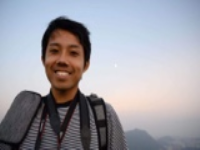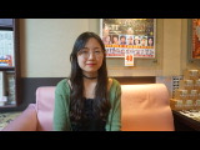|
||
|
||
|
| |||
| 10. 01. 2020 | ISSUE 5 | ||
|
| |||
| CCS Newcomers: MA | |||||
|
For this section, we asked some of our new MA students to share with us why they decided to study at the Centre for China Studies (CCS), what they did before joining us and how they experience their study at the Centre and CUHK in a time of mass demonstrations and social unrest. Keisuke Suzuki (MA, Issues in Contemporary China Stream)
Can you tell us about yourself? Why did you choose the Master of Arts in Chinese Studies to pursue your further studies? My name is Keisuke Suzuki, I was born and grew up in Japan, yet, I am enthusiastic about mainland China. I am also a Hong Kong lover since I had a lot of awesome experiences in this city when I was doing my Bachelor's degree. Actually, the geographical location of Hong Kong and the interdisciplinary study of China in this program are essential to me. I, as a Japanese, can understand the relationship between mainland China and Hong Kong closely. With this learning experience, I have strong confidence to work in Hong Kong and mainland China after graduating from the Chinese University of Hong Kong.
What was your impression of Hong Kong and the Chinese University of Hong Kong campus when you first visited? When I visited Hong Kong for the first time in 2014, I was so impressed by everything around me, such as the coexistence of megalopolis and nature. Moreover, I was inspired by the unique perspectives of my friends who lived in Hong Kong and mainland China, which helped enhance my global awareness. Since then, I have visited Hong Kong every year. After being enrolled in the program at CUHK, I have met so many intelligent students, and I am honoured to have this opportunity to study and exchange views with them.
What are your opinions on the current protests in HK? Have you participated in any of them? Why or why not? I have joined Hong Kong friends to go and observe some of the protests. My first introduction to the protests was through my friends, who actively took part in the 2014 movement. For me, it was fascinating to see that youngsters protest against the government, especially since most of the youngsters in Japan do not pay much attention to international issues. Coincidentally, I am now one of the witnesses who can experience the current protests. By reading articles and learning different perspectives from scholars, I realize that I should play a role to share the facts of what is happening in Hong Kong to the Japanese, via social media, in a neutral position.
The Centre for China Studies has organized different talks and screenings to help students understand the history and development of the current protests. Have you joined any of the activities? If yes, which one you think is the most remarkable? Why? I went to the "Being Caught Up in the Information Operations Among Hong Kong Protests" talk. Before the talk, I already knew there was an immense gap between factual information and fake news in different media. But I did not know many details. I still remember that most of the participants come from mainland China, and there was a very meaningful discussion, which helped me understand the importance of comparing the news in different media. Meanwhile, I was reminded that fake news can be one of the factors that lead to misunderstanding, and then cause serious troubles. After the talk, I am more conscious about how to get reliable information here in Hong Kong, and share it with my friends in Japan.
It's almost two-thirds of the way through the first term, do you think you have sufficient support from your teachers, TAs, and cohorts when you encountered any problems? Besides being busy, especially at this time of the term, how's your school life so far? Fortunately, my classmates, teachers, and TAs are very considerate and helpful. I strongly believe the decision I made to study in the MACS programme is correct, as well as meaningful and essential for my future endeavours. I will keep learning and study hard for each enrolled course, for this semester and the next, so as to better equip myself with academic knowledge and business intelligence.
Sylvia Li Xinyi (MA, Chinese Arts and Culture Stream)
Can you tell us about yourself? Why did you choose the Master of Arts in Chinese Studies to pursue your further studies? My name is Sylvia, Xinyi Li, I come from Changsha, Hunan province of China. I obtained my Bachelor's degree from Jishou University, with a two-year joint training program at Sun Yat-sen University. As a major in Chinese language and literature, I always consider artwork, including literature, film, and even games, as the vital reflection of people's living situations, as well as their mental conditions, and I am particularly interested in putting these in Chinese contexts. I have chosen MACS because I believe the courses provided by the program can inspire me on the path of searching for answers to the questions that mean a lot to me in both academic and personal ways.
Is it the first time you travel to/stay in Hong Kong? What's your first impression of Hong Kong and the Chinese University of Hong Kong campus? I have been to Hong Kong several times. As I previously studied in Guangdong Province for two years, it is convenient to take a trip to Hong Kong for a few days. In my experience, Hong Kong is a metropolis that accommodates all kinds of culture, but walking in the dense urban areas can be quite stressful! That stress is relieved when I am on the CUHK campus. Even though walking up the mountains is challenging, it is inevitable at the CUHK campus. Yet, the small details in the design of the facilities, and various slogans around the campus do make me feel that I am being taken care of.
What are your opinions on the current protests in HK? Have you participated in any of them? Why or why not? I did not participate in any of the protests in Hong Kong. I feel that participating in such a movement requires a clear recognition of its specific purposes and consequences, which I lack. The primary reason for not joining is that the protests became more and more violent after my arrival in September, and I am not sure what this kind of violence might cause and where it might lead Hong Kong to in the future. The second reason is because of my family. They urge me to focus on my studies and personal life, and to avoid all political issues for the concern of my safety. I would feel guilty to ignore their concerns and feelings.
The Centre for China Studies has organized different talks and screenings to help students understand the history and development of the current protests. Have you joined any of the activities? If yes, which one you think is the most remarkable? Why? Yes, I attended most of the screenings in the Hong Kong Protest Film Series, and I watched Ordinary Heroes (1999), Sunless Days (1990), and Lost in the Fumes (2017). All three screenings and the Q&A discussions gave me a bit more understanding about the influential historical elements in Hong Kong, and the thoughts of the locals. I would say SunlessDays was the most impressive one. I think different memories of the events recorded in this documentary are one of the important factors that keep influencing the mutual understanding between the mainland and Hong Kong today.
Two-thirds into the first term, did you receive sufficient support from your teachers, TAs, and classmates when you encountered any problems? Besides being busy, especially at this time of the term, how's your school life so far? |
|
||||
|
|
|||||
|
|
Past Issue
| |
|
|
|
|
|







